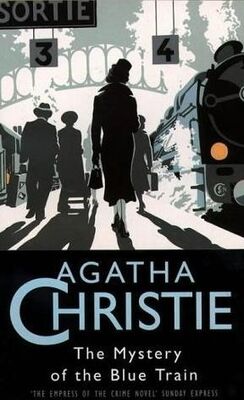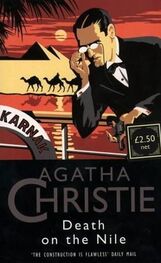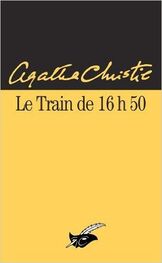Knighton stood staring at him as though stupefied. Then he made a movement, but Poirot flung up his hand in a warning gesture.
"No, don't move," he said in a silky voice;
"the door into the next compartment is open, and you are being covered from there this minute. I unbolted the door into the corridor when we left Paris, and our friends the police were told to take their places there.
As I expect you know, the French police want you rather urgently. Major Knighton -or shall we say-Monsieur le Marquis?"
"Explanations?"
Poirot smiled. He was sitting opposite the millionaire at a luncheon table in the latter's private suite at the Negresco. Facing him was a relieved but very puzzled man. Poirot leant back in his chair, lit one of his tiny cigarettes, and stared reflectively at the ceiling.
"Yes, I will give you explanations. It began with the one point that puzzled me. You know what that point was? The disfigured face. It is not an uncommon thing to find when investigating a crime and it rouses an immediate question, the question of identity.
That naturally was the first thing that occurred to me. Was the dead woman really Mrs. Kettering? But that line led me nowhere, for Miss Grey's evidence was positive and very reliable, so I put that idea aside.
The dead woman was Ruth Kettering."
"When did you first begin to suspect the maid?"
"Not for some time, but one peculiar little point drew my attention to her. The cigarette-case found in the railway carriage and which she told us was one which Mrs. Kettering had given to her husband. Now that was, on the face of it, most improbable, seeing the terms that they were on. It awakened a doubt in my mind as to the general veracity of Ada Mason's statements. There was the rather suspicious fact to be taken into consideration, that she had only been with her mistress for two months. Certainly it did not seem as if she could have had anything to do with the crime since she had been left behind in Paris and Mrs. Kettering had been seen alive by several people afterwards, but-"
Poirot leant forward. He raised an emphatic forefinger and wagged it with intense emphasis at Van Aldin.
"But I am a good detective. I suspect.
There is nobody and nothing that I do not suspect. I believe nothing that I am told. I say to myself: how do we know that Ada Mason was left behind in Paris? And at first the answer to that question seemed completely satisfactory. There was the evidence of your secretary, Major Knighton, a complete outsider whose testimony might be supposed to be entirely impartial, and there was the dead woman's own words to the conductor on the train. But I put the latter point aside for the moment, because a very curious idea-an idea perhaps fantastic and impossible-was growing up in my mind. If by any outside chance it happened to be true, that particular piece of testimony was worthless.
"I concentrated on the chief stumblingblock to my theory. Major Knighton's statement that he saw Ada Mason at the Ritz after the Blue Train had left Paris. That seemed conclusive enough, but yet, on examining the facts carefully, I noted two things. First, that by a curious coincidence he, too, had been exactly two months in your service.
Secondly, his initial letter was the same- 'K.' Supposing-just supposing-that it was his cigarette case which had been found in the carriage. Then, if Ada Mason and he were working together, and she recognized it when we showed it to her, would she not act precisely as she had done? At first, taken aback, she quickly evolved a plausible theory that would agree with Mr. Kettering's guilt. Bien entendu, that was not the original idea.
The Comte de la Roche was to be the scapegoat, though Ada Mason would not make her recognition of him too certain, in case he should be able to prove an alibi. Now, if you will cast your mind back to that time, you will remember a significant thing that happened. I suggested to Ada Mason that the man she had seen was not the Comte de la Roche, but Derek Kettering. She seemed uncertain at the time, but after I had got back to my hotel you rang me up and told me that she had come to you and said that, on thinking it over, she was now quite convinced that the man in question was Mr. Kettering. I had been expecting something of the kind. There could be but one explanation of this sudden certainty on her part.
After my leaving your hotel, she had had time to consult with somebody, and had received instructions which she acted upon.
Who had given her these instructions? Major Knighton. And there was another very small point, which might mean nothing or might mean a great deal. In casual conversation Knighton had talked of a jewel robbery in Yorkshire in a house where he was staying.
Perhaps a mere coincidence-perhaps another small link in the chain."
"But there is one thing I do not understand. Monsieur Poirot. I guess I must be dense or I would have seen it before now.
Who was the man in the train at Paris? Derek Kettering or the Comte de la Roche?"
"That is the simplicity of the whole thing. There was no man. Ah-mille tonnerres! -do you not see the cleverness of it all? Whose word have we for it that there ever was a man there? Only Ada Mason's. And we believe in Ada Mason because of Knighton's evidence that she was left behind in Paris."
"But Ruth herself told the conductor that she had left her maid behind there," demurred Van Aldin.
"Ah! I am coming to that. We have Mrs. Kettering's own evidence there, but, on the other hand, we have not really got her evidence, because, Monsieur Van Aldin, a dead woman cannot give evidence. It is not her evidence, but the evidence of the conductor of the train-a very different affair altogether."
"So you think the man was lying?"
"No, no, not at all. He spoke what he thought to be the truth. But the woman who told him that she had left her maid in Paris was not Mrs. Kettering."
Van Aldin stared at him.
"Monsieur Van Aldin, Ruth Kettering was dead before the train arrived at the Gare de Lyon. It was Ada Mason, dressed in her mistress's very distinctive clothing, who purchased a dinner basket and who made that very necessary statement to the conductor."
"Impossible!"
"No, no. Monsieur Van Aldin; not impossible.
Les femmes, they look so much alike nowadays that one identifies them more by their clothing than by their faces. Ada Mason was the same height as your daughter.
Dressed in that very sumptuous fur coat and the little red lacquer hat jammed down over her eyes, with just a bunch of auburn curls showing over each ear, it was no wonder that the conductor was deceived. He had not previously spoken to Mrs. Kettering, you remember.
True, he had seen the maid just for a moment when she handed him the tickets, but his impression had been merely that of a gaunt, black-clad female. If he had been an unusually intelligent man, he might have gone so far as to say that mistress and maid were not unlike, but it is extremely unlikely that he would even think that. And remember, Ada Mason, or Kitty Kidd, was an actress, able to change her appearance and tone of voice at a moment's notice. No, no, there was no danger of his recognizing the maid in the mistress's clothing, but there was the danger that when he came to discover the body he might realize it was not the woman he had talked to the night before. And now we see the reason for the disfigured face. The chief danger that Ada Mason ran was that Katherine Grey might visit her compartment after the train left Paris, and she provided against that difficulty by ordering a dinner basket and by locking herself in her compartment."
"But who killed Ruth-and when?" "First, bear it in mind that the crime was planned and undertaken by the two of them-Knighton and Ada Mason, working together. Knighton was in Paris that day on your business. He boarded the train somewhere on its way round the ceinture. Mrs. Kettering would be surprised, but she would be quite unsuspicious. Perhaps he draws her attention to something out the window, and as she turns to look he slips the cord round her neck-and the whole thing is over in a second or two. The door of the compartment is locked, and he and Ada Mason set to work.
Читать дальше








